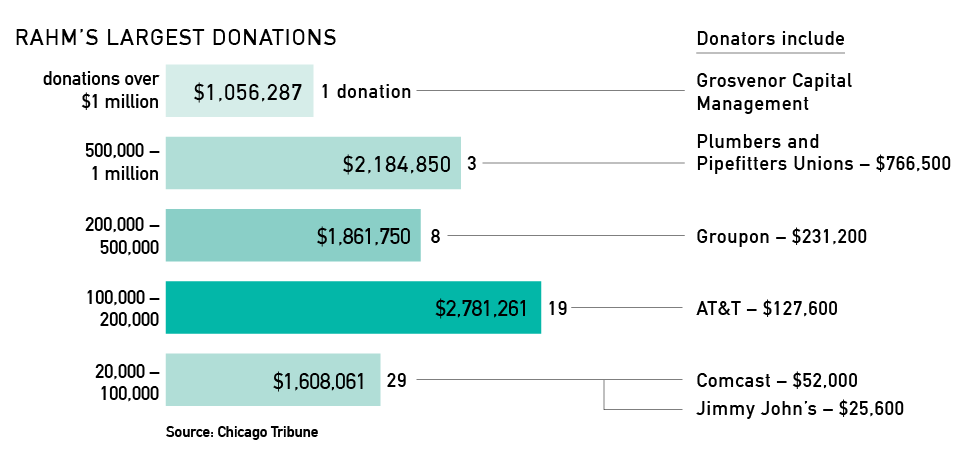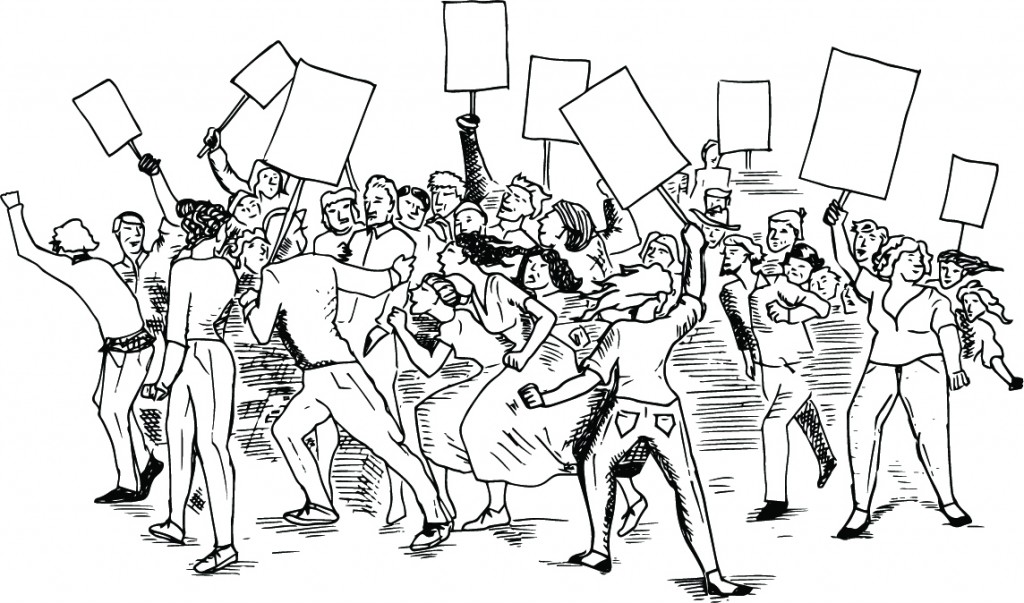A Look at Mayor 1%’s Past, and What It Might Mean for The Future

As the Chicago Mayoral election draws near, all eyes are on Mayor Rahm Emanuel. In a re-election campaign based largely on Emanuel’s sudden democratic change of heart, what does his nationally expected victory mean for the political landscape of Chicago? For the past four years school closures and private business dealings have left students without neighborhood schools, people without jobs, and Emanuel’s promise to change things feels empty.
Four years ago, Emanuel won the Chicago mayoral election with 55 percent of the vote in the first round of voting. This February his numbers and luck have run a bit lower. In August of 2014 the Chicago Tribune reported his approval rating at 35 percent. Since then, Emanuel has run his campaign with the promise of improving public finance, education, and business for the city of Chicago. In the past few years, however, Emanuel has done a mediocre job on the issues on which his mayoral campaign was based.
For perspective on Emanuel’s time in office, it might pay to look at how he came to be mayor in the first place.
Emanuel resigned in late 2010 from his position as White House Chief of Staff under the Obama administration in order to run for the office of Mayor of Chicago the following year. Then there were reports that he and Obama did not get along which would later be verified by Jodi Kantor’s book The Obama’s. The book talks about Emanuel and Michelle Obama being pitted against each other from the beginning of their relationship, which, apparently, is not uncommon for a Chief of Staff and a First Lady. In 2009 Emanuel promised Democratic Representative Allen Boyd from Florida that Michelle Obama would be at one of his campaign events, according to the Huffington Post, though Rahm had never told her about the event. After a tumultuous year and Emanuel’s resignation, President Obama endorsed Emanuel, saying he would make an “excellent mayor.”
One year after Emanuel won the race, he cut 34 jobs from the City’s Water Billing Center, boasting that he was saving the city $100,000 in the city’s $8.3 billion budget. This cut affected mostly middle class workers on the mostly black South and West sides of Chicago. Those jobs were outsourced to a call center in Japan. This was just the beginning of Emanuel’s cuts to jobs, pensions, and public services across the city while he awarded private contracts to companies that supported his campaign, companies owned by some of the wealthiest individuals in Chicago.
That same year, the mayor proposed $11 million in cuts to the already underfunded city libraries. Chicago’s aldermen talked Emanuel down to $8 million, which still meant more city job cuts. Then he cut the budget for elementary and secondary education, striking a chord with the Chicago’s Teacher Union (CTU) led by Karen Lewis, who would provide some of Emanuel’s most fervent opposition in the following years. This brought heavy attention to his campaign, including from the Chicago Reader, which asked the mayor why he didn’t fund more public services with some of the $700 million in Tax Increment Funds (TIF’s) the city has on hold for public service projects.
The TIF program is funded by property tax dollars from homeowners and businesses, in order to fund public projects intended to create jobs and revenue for the city. Instead the funds are often used for private projects like hotels and stadiums.
In 2012, for the first time in 25 years, the CTU went on strike, prompted by issues like fair pay and job security. For nine days unionized teachers struck unequal education funding by demonstrating on Chicago’s streets. As a result the Mayor negotiated a deal with the CTU in a contract that included hiring more than 600 teachers in art, music, and physical education. This brought the portion of teacher evaluations determined by standardized student test scores to the legal minimum of 30 percent and made textbooks available for students on the first day of school. At the time, the contract seemed like a victory for the CTU and CPS both, until 2013 when problems were still looming in public school funding.
In 2013 Emanuel closed 49 under-enrolled public schools on the South and West sides of Chicago, a national record. The Mayor and his staff, including the CEO of Chicago Public Schools, Barbara Byrd-Bennett, brushed off the effects of these closures. When more than 11,000 students were displaced, Byrd-Bennett in an open letter to the Chicago Sun Times claiming only seven of them had been unaccounted for, meaning they had not returned to school. Catalyst Chicago investigated the claim, and after a five-month tug-of-war with Chicago public officials journalist Sarah Karp found that at least 434 students were unaccounted for at the time the letter was written.

In Emanuel’s current campaign he has pledged $55 million in TIF funds to build a stadium for DePaul University, a private religious university where undergraduate students pay close to $30,000 in tuition, as well as a Marriott hotel across from the stadium. Aside from the promises of job creation that these two establishments will provide, that’s $55 million that taxpayers won’t see put back into public programs. It didn’t help that Pando Daily wrote about Kenneth Griffin’s hedge fund Citadel purchasing large stock in Marriott Corporation just before Emanuel had named it the hotel chain that would get the land near the stadium. Griffin had previously made a six-figure donation to Emanuel’s campaign.
Some of the largest donors on Emanuel’s funding reports since 2010 include companies like Grosvenor Capital Management, Citadel, Groupon, and United Airlines. This gives the public great reason to be skeptical about his transformation from a mayor who cuts city jobs and public resources to one who pledges to add an addition to a public high school, even a school like Walter Payton High School in the affluent Old Town neighborhood. The pledge also comes after the Chicago Reader reported that Alderman Nick Sposato, began a drive to collect toilet paper for local schools.
Why would Emanuel’s offenses against CPS stop there? The Economist recently reported that “Mr. Emanuel often stresses that the gap between the wealthy, mainly white north of the city and the poor, largely black south begins in early childhood.” Emanuel made the decision to pay for an expansion of pre-K programs for less-funded schools by borrowing money from wealthy bankers instead of using the allotted budget for CPS. Taxpayers now have the additional burden of paying off the interest on these loans. The plan to provide this education for low-income children bases itself in the reality that the children in these classes will have to outscore other children from the same area. In essence, this means that only half of the children from low-income areas will get pre-K classes with 17 students per teacher, while the other half are stuck in crowded classrooms of around 30 students per teacher.
When President Obama endorses Emanuel in a radio campaign, as he recently did, and brings in Magic Johnson to try and salvage those last few votes, it seems like a desperate attempt to undo the wrongs he has done to middle and lower class Chicagoans over the past four years. Emanuel has been catering to the wealthiest parts of Chicago while leaving residents in the South and West sides of the city without the same resource allocations. Many schools on the South and West sides don’t have air conditioners, libraries, or enough teachers, and none of this seems likely to change with another four years of Emanuel. The Mayor’s use of his power to trade city grants and favors for campaign contributions is what earned him the nickname Mayor 1%. It is, of course, impossible to predict the future of Chicago’s political landscape in the next four years with absolute certainty, but we can make a pretty good guess what it would mean if Rahmbo were re-elected.







